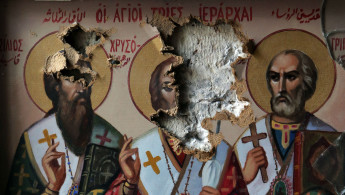Syria's disappearing Christians and the propaganda war
When the first tremors of unrest were felt in Syria in 2011, the country's Christian population stood at around 2 million - roughly 10 percent of the country's population. Now, after five years of fighting, the cities Christian populations have been hollowed out by the exodus of religious minorities amid heavy fighting and the proliferation of extremist groups.
One city which has witnessed a Christian flight is war-torn Aleppo. Some estimate] that only 10 percent of the pre-war Christian population still live in the city, while others suggest a third. Either way, Christian Aleppans have faced kidnappings and executions at the hands of the Islamic State group. Like Syrians from other religious groups they have been caught up in the crossfire in fighting between regime and rebel forces.
Many have decided to flee to Europe or seek refuge in neighbouring countries. Syria now stands perilously close to ending a two millenium presence of Christians in its lands, which are steeped in Christian heritage and tradition.
Indeed, it was on the road to Damascus that the apostle Paul is said to have received his divine inspiration. It is also within Syria that the language that Jesus is thought to have spoken, Aramaic, is kept alive by a small Assyrian population. Today, however, Christian communities in Syria face perhaps the biggest threat to their existence in over a millennia.
Such is the extent of Christian flight that there have been numerous pleas from Syrian Christian church leaders for their flocks to stay in the war-torn country. Just recently, the Chaldean Bishop of Aleppo slammed Europe for opening its borders to refugees. He said that many Christians had left Syria in order to abscond from military service. He also went on to attack Western "propaganda" against President Bashar al-Assad's regime.
"The portrayal of Assad as a dictator is Western propaganda," Bishop Antoine Audo told Germany's n-tv news. "Many have died during Syria's war, but they haven't only been killed by government forces. Why doesn't the West talk about the political factions which have killed people in Turkey and Saudi Arabia?"
Audo's words echo numerous other calls by Syrian clergymen for Christians to support Assad's regime in Damascus. This includes Archbishop Jean-Clement Jeanbart, also of Aleppo, who called on Western countries to back Assad against the rebels.
 |
The words of Syria's clergymen have little bearing on the broader reality of the conflict. |  |
"As long as Europe and the USA have been involved, we have seen no results despite the coalition bombing, but with the Russian intervention maybe things will change", the Archbishop told the Daily Telegraph.
Linking Christian plight to the fate of the regime, however, is just another way that perceptions of the Syria crisis have been distorted through the lenses of sectarianism and religious conflict.
Naturally, the rise of Islamic extremist groups in Syria has been a cause for alarm for the country's Christian minorities. However, the words of Syria's clergymen have little bearing on the broader reality of the conflict. Whilst it is true that the Assad regime has fought IS and al-Qaeda affiliates from Christian cities like Maaloula in the past, the language of the clergymen only plays into the divide-and-conquer tactics that have been at work since the Syrian uprising descended into all out civil war in 2011.
Almost six years after the conflict began, the exploitation of sectarian tensions in the Middle East by rival nations, and the atrocities committed by the Islamic State group, have led many to forget the peaceful, non-sectarian protests that first sparked off the Syrian uprising in March 2011.
The calls for justice and political reform by Syrians of all faiths and creeds have now become clouded by the language of sectarianism and religious violence that dominates much of the commentaries regarding the conflict.
The flight of Syria's Christians is a loss that will perhaps only get worse as the war continues with no end in sight. This loss, however, is one for both the Syrian people and the broader Middle East region. However, it is not for those who are using the tragedy as a way of propping a regime that uses religious and sectarian division in its desperate attempt to hold onto power.

![sudan women [getty] sudan women [getty]](/sites/default/files/styles/image_330x185/public/media/images/5019D7F4-52AF-4377-8A05-885D27476479.jpg?h=d1cb525d&itok=tKXV7r-W)
